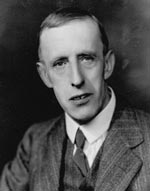Sir Frank Merry Stenton FBA (17 May 1880 – 15 September 1967) was an English historian of Anglo-Saxon England, a professor of history at the University of Reading (1926–1946), president of the Royal Historical Society (1937–1945),[1] Reading University's vice-chancellor (1946–1950).
Frank Stenton | |
|---|---|
 | |
| Born | 17 May 1880 Manchester, England |
| Died | 15 September 1967 (aged 87) |
| Nationality | English |
| Education | Keble College, Oxford |
| Occupation | Historian |
| Spouse | Doris Mary Stenton |
Life
editThe son of Henry Stenton of Southwell, Nottinghamshire,[2] he was educated at Keble College, Oxford, and was elected an Honorary Fellow in 1947.[3]
With Allen Mawer, Stenton wrote the second English Place-Name Society volume, The Place-Names of Buckinghamshire, published in 1925. He delivered the Ford Lectures at Oxford University in 1929. He went on to write Anglo-Saxon England, a volume of the Oxford History of England, first published in 1943 and described by Simon Keynes as "magisterial and massively authoritative".[4] In the view of Nicholas Higham writing in 1992 it "remains the most complete study of Anglo-Saxon history that has ever appeared. He was himself a historian of the first rank, an eminent place-name scholar and in addition well versed in archaeological literature."[5]
Stenton was a professor of history at the University of Reading (1926 – 1946), and subsequently the university's vice-chancellor (1946–1950). During his period as vice-chancellor at Reading, he presided over the university's purchase of Whiteknights Park, creating the new campus that allowed for the expansion of the university in later decades. In November 2008, it was announced that a new hall of residence to be constructed on that campus would be named Stenton Hall, in his honour.[6] The annual Stenton Lecture, given by an eminent historian, was inaugurated at Reading University in 1967.[7]
He was knighted in the 1948 New Year Honours,[8] and received the accolade from King George VI at Buckingham Palace on 10 February 1948.[9]
His wife, Doris Mary Stenton, wrote a preface to the third edition of Anglo-Saxon England, published after his death, and edited Preparatory to Anglo-Saxon England: Being the Collected Papers of Frank Merry Stenton, published in 1970. She was a historian in her own right, producing English Society in the Early Middle Ages for the Pelican History of England, and The English Woman in History (1957).[7]
Stenton's papers, together with those of his wife Doris, Lady Stenton, their library and his coin collection are part of the Special Collections in the University of Reading.
Publications
editStenton's major publications were The First Century of English Feudalism, 1066–1166 (1932) and Anglo-Saxon England (1943). Other publications include:
References
edit- ^ Institute of Historical Research, Summary; Royal Historical Society, 'About Us' Archived 2010-02-09 at the Wayback Machine. Retrieved 19 February 2010.
- ^ Northamptonshire Past and Present. Vol. 3–4. Northamptonshire Record Society. 1960. p. 181.
- ^ Drennan, Basil St G., ed. (1970). The Keble College Centenary Register 1870–1970. Keble College, Oxford. p. 3. ISBN 978-0-85033-048-9.
- ^ Keynes, Simon (2003). "Introduction". An Introduction to Anglo-Saxon England by Peter Hunter Blair with a New Introduction by Simon Keynes (3rd ed.). Cambridge, UK: Cambridge University Press. p. xxi. ISBN 978-0-521-83085-0.
- ^ Higham, Nicholas (1992). Rome, Britain and the Anglo-Saxons. London, UK: Seaby. p. 7. ISBN 978-1-85264-022-4.
- ^ "University of Reading Bulletin (20 November 2008)" (PDF). University of Reading. p. 3. Retrieved 20 November 2008. [dead link]
- ^ a b "Stenton Lecture". University of Reading, Dept. of History. Retrieved 4 May 2018.
- ^ "No. 38161". The London Gazette (Supplement). 30 December 1947. p. 2.
- ^ "No. 38207". The London Gazette. 13 February 1948. pp. 1035–1036.
External links
edit- Works by or about Frank Stenton at the Internet Archive
- Stenton Papers
- Stenton Library
- Stenton Coin Collection
- Audio recording of Stenton's 1958 lecture "The Anglo-Saxon Coinage and Historians" to the British Numismatic Society